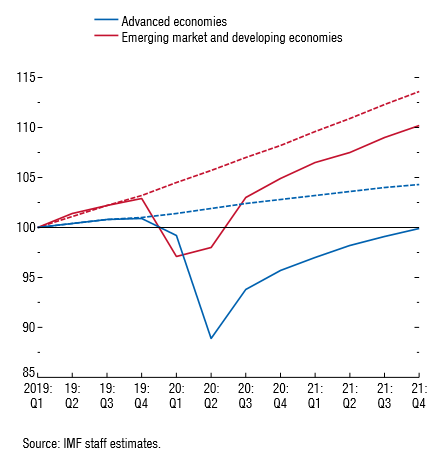Since the Coronavirus outbreak started in China last year, the worldwide economy started to fall at unprecedented levels. Now that also Europe and the US have started to feel the negative effects, the economies are at risk and analysts are anticipating a recession. It is clear that the global economy needs a boost, and Central banks around the world seem to have understood this and are starting to take action.
On 18th March 2020, the European Central Bank announced a €750 Billion Pandemic Emergency Purchase Program (PEPP). This allows EU member states to increase spending to counter the impact of the coronavirus. The Governing Council decided to launch a temporary program of asset purchasing, both in the public and private sectors, aiming to reduce the alarming effects on the monetary policy that the spread of COVID-19 is provoking. The ECB's bazooka comes after heavy criticism for not doing enough to stem the fallout from the Coronavirus outbreak. The new project will have a total of €750 billion, which will contribute to the purchase of all the assets that are eligible also under the existing asset purchase program (APP) until the end of 2020. The bank's total planned purchases for the year are now 1.1 trillion euros, which is the biggest annual amount ever. The newly agreed buys alone worth not less than 6 percent of the euro zone’s GDP.
Regarding the securities from the public sector, national central banks will be responsible for the benchmark allocation across jurisdictions. The program is not a strict one, and all the purchases that are made under it will be flexible. PEPP allows for fluctuations in different areas, such as the distribution of purchase flows over time, asset classes, and jurisdictions.
However, the project will not last forever. The Governing Council will terminate the purchases under the PEPP once the Covid-19 crisis is over, but not before the end of the year.
Another provision of this massive stimulus is to expand the range of eligible assets under the “Corporate Sector Purchase Programme” (CSPR) to non-financial commercial paper, this way making all commercial papers of sufficient credit quality eligible. At the same time, ECB wants to ease the collateral standards by adjusting the main risk parameters of the collateral framework. More specifically, it will expand the scope of Additional Credit Claims (ACC) to include claims related to the financing of the corporate sector. This way, it is certain that counterparties can continue to make use of the Eurosystem’s refinancing operations.
Extreme times call for extreme measures and ECB is committed to playing its role and support the economy and the citizens affected in this extremely challenging situation. The program aims to ensure that all sectors, especially the ones hit hardest, can benefit from supporting financing conditions. Moreover, European Central Bank announced that it is prepared to increase the size of the asset purchase programme by as much as necessary and for as long as needed, without taking risks. It will continue to explore ways in which it can support the economy to absorb this shock. The President, Christine Lagarde adopted a “Whatever it takes” approach that will help Eurozone’s markets and economy. Markets have been rapid in response: Italian and Greek bond yields plunged after the announcement.
The plan announced by the ECB on March 18th was not the only action taken in this sense. The Bank of England also announced, one day later, a £200Billion asset-purchase program and cut the interest rates to 0.1 percent. This is the lowest value in the Bank’s 325-year history. The BOE had previously cut rates from 0.75% to 0.25% on March 11. In addition, it decided to cancel stress tests for UK’s biggest lenders, to let the bank’s resources be allocated in fighting the Covid-19 crisis.
These measures ought to stabilize liquidity concerns in the eurozone and the UK. However, Ms. Lagarde and Andrew Bailey, the new Bank of England governor, say this will not be enough. They encourage politicians to follow up with spending programmes that provide support to workers and businesses affected by the Covid-19 Crisis. They emphasize that pouring liquidity in the financial sector cannot help families pay bills without additional money coming in.
Italy’s 10-year bond yield surged above 2.1%, up nearly 0.4 percentage points, as remarks made by ECB president Christine Lagarde last week continue to ricochet through debt markets. Italian spreads above German bonds — seen as a key measure of country risk in the eurozone — hit their highest level since last June. One thing is for sure: The eurozone’s governments (and not only) are all having a tough time. But at the same time, the spreads between the hardest hit members and those at its core are widening.
Italy has the highest one number of coronavirus cases outside of China, and other EU countries like Spain, Germany and France are all seeing a rapid spread of the virus, which means that the big economies of Europe will all be affected.
Ana Letitia Cosniceru
Want to keep up with our most recent articles? Subscribe to our weekly newsletter here
Ana Letitia Cosniceru
Want to keep up with our most recent articles? Subscribe to our weekly newsletter here
